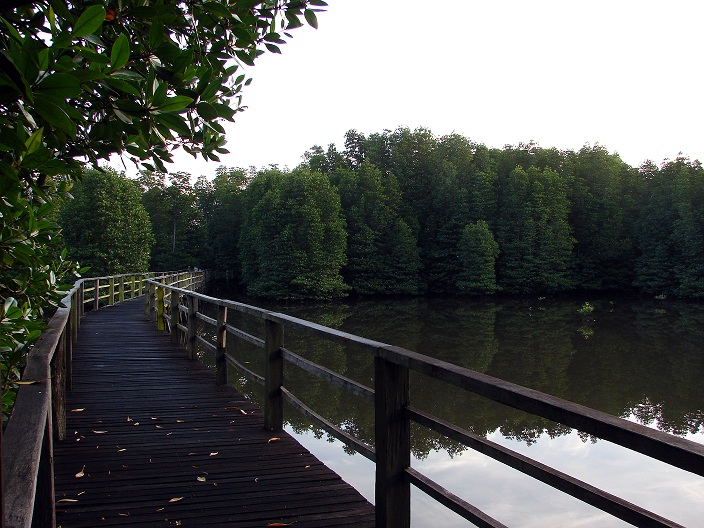A group of secondary students from Japan has volunteered to come to
Sabah for the first time to plant mangroves and even donated RM3,500 in
support of the State’s project on rehabilitation of degraded mangroves.
State Forestry Department (SFD) Director Datuk Sam Mannan said
the group of students from Ritsumeikan Uji High School in Kyoto was
brought by Professor Shigeyuki Baba, Executive Director of the
International Society for Mangrove Ecosystem (ISME).
He said the trip to Sabah was in conjunction with the third
meeting of the Project Steering Committee on rehabilitation of degraded
mangroves that was held in Sandakan yesterday.
It was part of the collaboration between SFD and ISME that was
sealed on November 10, 2010 to implement the rehabilitation project.
Sam said the students, led by their teacher Saori Matsuoka, were
all excited about the trip and took part in planting mangroves in Sungai
Lalasun, Sandakan.
He added that from the funds raised for the trip, the students
donated 10,000 Yen (more than RM3,500) to SFD in support of mangrove
rehabilitation in the State.
Recognising the importance of cultural exchange and nature
education, the students visited SMK Muhibbah Sandakan, the Orang Utan
Rehabilitation Centre and the Labuk Bay Proboscis Monkey Centre.
Sam said the collaborative project between SFD and ISME is funded
by Tokio Marine & Nichido Fire Insurance Co. Ltd, and the first
phase of the project would be for three years (2011-2014 with an annual
target of 50 hectares.
He said the ISME had remitted RM206,300 to SFD to support the
expenditures of rehabilitation work for the first year and from October
2011 to March 2012, the project had planted 50 hectares of degraded
mangroves in forest reserves of Sandakan and Beaufort.
The PSC was formed and chaired by the Director of SFD to monitor
the progress of the project, and thus far, the committee had met three
times in Sandakan.
ISME was established in 1990 to promote research, conservation,
rational management and sustainable use of mangrove ecosystems. With its
Secretariat located at the University of the Ryukyus, Okinawa, Japan,
the society now has over 1000 members from 90 countries/regions.
During the Society’s 8th General Assembly and Mangrove Workshop
in Sandakan in September last year, SFD was awarded an honorary
institutional membership of ISME.
Sam said such collaboration presented a great opportunity for SFD to strengthen its capacity in mangrove rehabilitation.
“SFD is honoured to be chosen by the Society for the project implementation.
“Sabah is the first state in Malaysia to have such collaboration
with ISME and this may herald the beginning of other collaborative
efforts between institutions in Japan and Sabah in the future,” he
added.

Photo Source: http://www.borneotourstravel.com/sabah-history/kk-city-bird-sanctuary/







10 comments:
A group of secondary students from Japan has volunteered to come to Sabah for the first time to plant mangroves and even donated RM3,500 in support of the State’s project on rehabilitation of degraded mangroves.
We are thankful for the Japanese Secondary students who gave their effort and monetary help to support the mangroves rehabilitation.
This is a very good cultural exchange program to allow the Japanese students to learn more about our local environment protection efforts as well as the local cultural experience.
Agree YB, we are grateful for the student's interests and support towards our effort in rehabilitate the degraded mangroves.
Maybe our environmental protection efforts will be able to attract more foreign students to participate in these cultural experience.
Ganbatte to the Japanese Students who spend time to help out in the mangroves replanting activities.
Program sebegini harus dijalankan selalu agar para pelajar dapat berkongsi pengalaman dan pengetahuan.
Semoga lebih banyak lebih banyak pelajar dari negara lain dapat menyertai program tersebut.
Sikap memelihara alam sekitar amat penting.
jika pelajar2 Jepun boleh melaksanakan aktiviti amal seperti ini, pelajar2 tempatan juga tidak patut mempunyai masalah untuk melakukan perkara yang sama..
mungkin selepas ini, giliran pelajar2 Malaysia pula membuat rombongan untuk melakukan aktiviti amal di Jepun.. hubungan seperti ini perlu dikekalkan bukan sahaja untuk kebaikan alam sekitar malah untuk kebaikkan ekonomi antara kedua2 negara..
Post a Comment